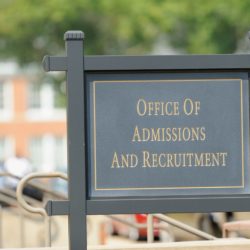The families I advise are generally aware of legacy admission practices, but many are less informed regarding its origins and the degree of advantage that it affords them.
As an independent educational consultant who works directly with students who benefit from this policy, I can also vouch for the pressure, and even embarrassment, this adds to an already stressful process. Not unlike the Varsity Blues scandal, students are the ones caught in the crosshairs of outside influences and expectations that can infringe on and even deter the process of finding that perfect-fit college.
Although increasing college access and diversity is a growing priority for colleges, I have found legacy admissions to be the proverbial elephant in the room. The contradictory policy of legacy status still appears to be considered sacrosanct by many postsecondary institutions. College admissions is subjective, and the institutional priorities that define who is admitted each year often place emphasis on varying qualities that are not associated with academic merit: athletics, ability to pay, etc. However, the notion that an advantage is granted to applicants based on historical ties to the college is completely unjust when considering our country’s painful history of denying postsecondary access to students based on race, gender, and religion. Many colleges have a page on their websites dedicated to a commitment to diversity, equity, and inclusion, yet duplicitously maintain legacy status in the admissions process, giving a clear (non-merit-based) boost to more privileged populations.
Dartmouth College is the notorious trailblazer of legacy admissions, first introducing the practice in 1922, with other colleges such as Yale following closely behind. The origins of using legacy in admissions are seeded in nativism and antisemitism, created to ensure that certain populations remained excluded. Selective colleges such as Harvard and Princeton have single digit admit rates for the general population, yet admit about a third of legacy status applicants. At Cornell University, legacy admits make up “around 15% of the student body,” almost five times that of the Black student population, or almost equal to that of the entire Black and Latino populations combined. Although colleges have confirmed that legacy admits are often academically qualified, competitive applicants, this practice has given additional privileges to an already affluent population, further compounding inequity in the admissions process and serving as a barrier to achieving higher rates of diversity at college campuses. Furthermore, those who promote the use of legacy admission say it guarantees loyal alumni giving; research shows there is no correlation.
Amherst College is the most recent institution to end legacy admission preference, citing it as a policy “that inadvertently limits educational opportunity.” The College is also strengthening its financial aid programming in an effort to making an Amherst experience more affordable and accessible to all students. Amherst joins the ranks of colleges like MIT and the California Institute of Technology in creating a holistic approach to admission that does not factor in alumni connections.
Although legacy status is just one aspect of a college admissions process already rife with advantages for the wealthy and privileged, eliminating it is one solid gesture that all colleges can take to “walk the walk” in their diversity, access, and inclusion efforts. I applaud Amherst College, and its predecessors, for having the courage to make bold changes to embrace a new legacy that embodies the visionary leadership our students and families deserve. Breaking with past practices is something we all must be willing to do to create meaningful change for the diverse populations of students that we are called to serve and advocate for as college access professionals.
By Yvonne Espinoza, IECA (TX)
Yvonne Espinoza, Yvonne Espinoza College Counseling Services, can be reached at [email protected]










